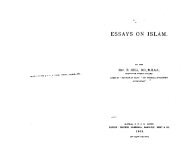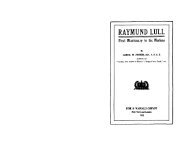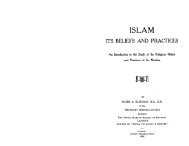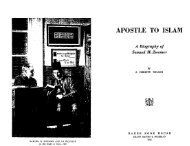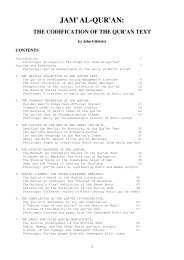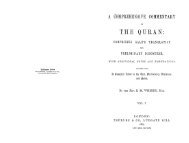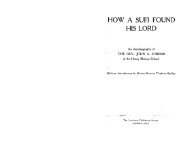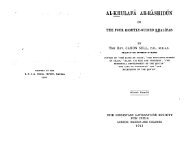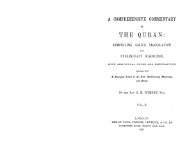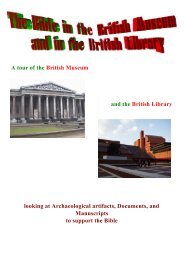Guillaume--Life of Muhammad.pdf - Radical Truth
Guillaume--Life of Muhammad.pdf - Radical Truth
Guillaume--Life of Muhammad.pdf - Radical Truth
You also want an ePaper? Increase the reach of your titles
YUMPU automatically turns print PDFs into web optimized ePapers that Google loves.
The <strong>Life</strong> <strong>of</strong> <strong>Muhammad</strong><br />
'Twill never fail or ever run dry,<br />
'Twill water the pilgrim company<br />
Like an ostrich flock a fraternity,<br />
Their voice God hears most graciously.<br />
A pact most sure from days gone hy<br />
Nought like it canst thou descry,<br />
It lies 'twixt the dung and the flesh bloody (J09).'<br />
94 It is alleged that when this was said to him and he inquired where Zamzam<br />
was, he was told that it was by the ants' nest where the raven will peck<br />
tomorrow, but God knows how true this is. The next day 'Abdu'l Mullalib<br />
with his son al-l;Iarith, who at that time was his only sao, went and<br />
found the ants' nest and the raven pecking beside it between the two idols<br />
Isaf and Na'ila at which Quraysh used to slaughter their sacrifices. He<br />
brought a pick-axe and began to dig where he had been commanded.<br />
Quraysh seeing him at work came up and refused to allow him to dig<br />
between their two idols where they sacrificed. 'Abdu'I-Mullalib then told<br />
his son to stand by and protect him while he dug, for he was determined<br />
to carry out what he had been commanded to do. When they saw that he<br />
was not going to stop work they left him severely alone. He had not dug<br />
deeply before the stone top <strong>of</strong> the well appeared and he gave thanks to<br />
God knowing that he had been rightly informed. As digging went further,<br />
he found the two gazelles <strong>of</strong> gold which Jurhum had buried there when<br />
they left Mecca. He also found some swords and coats <strong>of</strong> mail from Qal'a.'<br />
Quraysh claimed that they had a right to share in this find. 'Abdu'l<br />
MUllalib denied this, but was willing to submit the matter to the sacred<br />
lot. He said that he would make two arrows for the Ka'ba, two for them,<br />
and two for himself. The two arrows which came out from the quiver<br />
would determine to whom the property belonged. This was agreed, and<br />
accordingly he made two yellow arrows for the Ka'ba, two black ones for<br />
himself, and two white ones for Quraysh. They were then given to the<br />
priest in charge <strong>of</strong> the divinatory arrows, which were thrown beside Hubal.<br />
(Hubal was an image in the middle <strong>of</strong> the Ka'ba, indeed the greatest <strong>of</strong><br />
their images. It is that referred to by Abu Sufyan ibn !:Iarb at the battle <strong>of</strong><br />
Uhud when he cried 'Arise Hubal', i.e. IVlake your religion victorious!)<br />
'Abdu'I-Munalib began to pray to God, and when the priest threw the<br />
arrows the two yellow ones for the gazelles carne out in favour <strong>of</strong> the Ka'ba.<br />
The two black ones allotted the swords and coats <strong>of</strong> mail to 'Abdu'l<br />
MUllalih, and the two arrows <strong>of</strong> Quraysh remained behind. 'Abdu'l<br />
MUllalib made the swords into a door for the Ka'ba and overlaid the door<br />
with the gold <strong>of</strong> the gazelles. This was the first goldt;],!, ornament <strong>of</strong> the<br />
Ka'ba, at any rate so they allege. Then 'Abdu'I-Munalib took charge <strong>of</strong><br />
the supply <strong>of</strong> Zamzam water to the pilgrims.<br />
1 As these lines are in part identical with those mentioned above, clearly this is a rival<br />
account <strong>of</strong> the vision.<br />
2 A mountain in Syria, though other sites have been suggested. See Yliqu t.<br />
The <strong>Life</strong> <strong>of</strong> ]1,luhammad<br />
WELLS BELONGI'iG TO THE CLANS OF QURAYSH IN<br />
MECCA<br />
Before the digging <strong>of</strong> Zamzam Quraysh had akeady dug wells in Mecca 95<br />
accordmg to what Ziyad b. 'Abdullah al-Bakka'1 told me from <strong>Muhammad</strong><br />
b. Isl;!aq., He said that 'Abdu Shams b. 'Abdu Mana[ dug al-Tawiy which<br />
IS a well ~~ the u~per part <strong>of</strong> l\1ecca near al-BaY95.', the house <strong>of</strong> <strong>Muhammad</strong><br />
b. Yusuf al- fhaqafi.<br />
Hashim b. 'Abdu Mana[ dug Badhdhar which is near al-Mustandhar, a<br />
spur <strong>of</strong> Mount al-Khandama at the mouth <strong>of</strong> the pass <strong>of</strong> Abu Talib. They<br />
allege that when he had dug It he said: '1 will make it a means <strong>of</strong> subsistence<br />
for the people' (110).<br />
!'fe' dug Sajl~ which is a well belonging to al-Murim b. 'Adiy b. Naufal<br />
b. Ab~u Manaf whIch IS stdl used today. The B. Naufal allege that<br />
al-Mut 1m bought It from Asad b. !:Iashim, while B. Hashim allege that<br />
he gave it to him when Zamzam ,vas uncovered and people had no further<br />
use for the other wells.<br />
, Um~Yra b. 'Abdu Shams dug al-!:Iafr for himself. The B. Asad b.<br />
Abdu 1- Uzza dug Suqayya' which belongs to them. The B. 'Abdu'l-Dar<br />
dug Umm Al;!rad. The B. Jumal;! dug al-Sunbula which belongs to Khalaf<br />
b. Wahb. The B. Sahm dug al-Chamr which belongs to them.<br />
Th~re were ~o~e old wells outside Mecca dating from the time <strong>of</strong> Murra<br />
b. Ka band KIlab b. Murra from which the first princes <strong>of</strong> Quraysh used<br />
to dr~w wate:, namely Rumm and Khumm. Rumm was dug by Murra<br />
b. Ka b b. Lu ayy, and Khumm by B. Kilab b. Murra, and so was al-Hafr.'<br />
Ther~ IS an old poem <strong>of</strong>!:Iudhayfa b. Ghanim, brother <strong>of</strong> B. 'Adiy b. 'Ka'b<br />
b. Lu ayy (IJ I), which runs:<br />
In the good old days we were long satisfied<br />
To get our water from Khumm or al-I:Iafr.<br />
Zamzam utterly eclipsed the other wells from which the pilgrims used 96<br />
to get theIr water, and people Went to it because it was in the sacred enclosure<br />
and because its water was superior to any other; and, too, because it<br />
was the well <strong>of</strong> Isma'il b. Ibrahim. Because <strong>of</strong> it B. 'Abdu Mana[ behaved<br />
boastfully towards Quraysh and all other Arabs.<br />
~ere are sor:re lines<strong>of</strong> Musafir b. Abu 'Amr b. Umayya b. 'Abdu Shams<br />
b. AbduManaf b~astlUgover Quraysh that they held the right <strong>of</strong> watering<br />
and feedlllg the pdgnms, and that they discovered Zamzam, and that B.<br />
,I The editor has bee? untidy here. Commentators point out that Hashim did not dig<br />
thi:ls we~I, and ~l-?u~~~h quotes a poem beginning 'I am Qu~ayy and I dug Sajla'.<br />
Neither Yaqut (m. 105 ~~d 305) 'nor the ancients knew whether the well was called<br />
Su,qayya o~<br />
Shufayya.. Azr. II. In names only Shufayya.<br />
It has Just been said that Umayya ?'. '~bdu Shams dug al·l;Iafr. Yiiqut says 'l;Iafr ...<br />
b.eJongs to B: Taym b, Murra ... al-l;Iazlml spelt it 1afr.' This may account for the inconsistency,<br />
as It seems that there were two wells, !;faCr and Jafr, in Mecca.<br />
B 4080<br />
F



